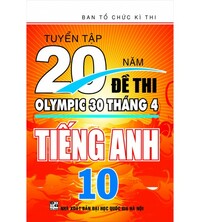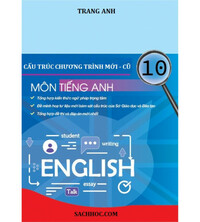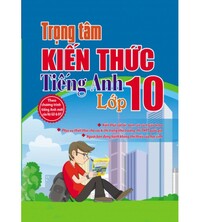Đề thi giữa kì 2 Tiếng Anh 10 iLearn Smart World - Đề số 4
I. Mark the letter A, B, C or D on your answer sheet to indicate the word whose underlined part differs from the other three in pronunciation in each of the following questions. II. Mark the letter A, B, C or D on your answer sheet to indicate the word that differs from the other three in the position of the main stress in each of the following questions. III. Mark the letter A, B, C or D on your answer sheet to indicate the correct answer to each of the following questions.
Đề bài
I. Mark the letter A, B, C or D on your answer sheet to indicate the word whose underlined part differs from the other three in pronunciation in each of the following questions.
1. A. ban B. damage C. landfill D. material
2. A. recycle B. compost C. cattle D. community
II. Mark the letter A, B, C or D on your answer sheet to indicate the word that differs from the other three in the position of the main stress in each of the following questions.
3. A. fasten B. network C. private D. invent
4. A. portable B. telescope C. inventor D. instantly
III. Mark the letter A, B, C or D on your answer sheet to indicate the correct answer to each of the following questions.
5. I found this book on my desk when I came to my English class yesterday. It __________ by one of the students in the earlier class.
A. was leaving B. have left C. was left D. was leave
6. I don’t think this jacket is a good choice. It’s __________ to wear leather jackets at the moment.
A. fashion B. fashionable C. unfashionable D. fashionably
7. Microplastics that are __________ from plastic water bottles can cause serious health problems.
A. dumped B. got rid C. released D. leaked
8. The place has quickly developed __________ a small fishing community __________ a popular tourist resort.
A. from / into B. from / to C. out of / into D. out of / inside
9. The Internet connects people around the world. __________, we can make friends with people in different countries via social networking sites.
A. However B. Such as C. Although D. For example
10. Traffic fumes contribute greatly to air __________ in this city.
A. pollute B. polluter C. pollutant D. pollution
11. Registration form should be __________ by guests.
A. written out B. filled in C. filled up D. drawn
12. There are many chemicals that __________ the ozone layer, one of which is CFC.
A. damage B. injure C. hurt D. erode
13. Studies show that trees and plants improve air __________ which is very bad now because of the traffic.
A. amount B. atmosphere C. quantity D. quality
14. Air pollution leads __________ global warming and many health problems.
A. into B. to C. on D. up to
IV. Mark the letter A, B, C or D on your answer sheet to indicate the word or phrase that is CLOSEST in meaning to the underlined part in each of the following questions.
15. Always make sure that the kids are safely strapped into their car seats.
A. connected B. glued C. tied up D. fastened
16. If we reuse plastic packaging and plastic bottles, we will reduce pollution.
A. use something less B. use something twice
C. use something again D. stop using something
V. Mark the letter A, B, C or D on your answer sheet to indicate the word or phrase that is OPPOSITE in meaning to the underlined part in each of the following questions.
17. There are twin, double and single rooms available, all with private facilities.
A. civil B. public C. common D. exclusive
18. People should decrease the amount of fat and sugar that they eat.
A. eat slowly B. increase C. reduce D. develop
VIII. Write the correct forms of the words in brackets.
19. Schools should encourage the full __________ of a student’s talents. (DEVELOP)
20. One __________ to environmental problems is to raise people’s awareness. (SOLVE)
IX. Rewrite the following sentences without changing their meaning. Use the given word(s) if any.
21. You must turn off electronic devices before take-off.
=> Electronic devices __________________________.
22. I never forget the garden. We met each other for the first time at this garden.
=> I never forget the garden ______________________.
23. Not everyone uses electric cars. The air is polluted.
=> If everyone _________________________________.
24. It’s the best homemade pizza. I have never eaten anything better.
=> It’s the best homemade pizza ___________________.
25. You borrowed the books from the library. You have to take good care of them.
=> You have to take good care of the books ___________.
X. Read the following passage and choose the word that best suits each blank.
I come from a town where people really care about the environment. We don’t want to live in a place that is dirty and full of pollution. So, we try our best to keep it clean. It isn’t always easy, but we do the best we can! There are many places and people that are working together to help make our town and the world better. At the markets, many of the owners and managers have started to (26) ________ single-use plastics because they cause too much pollution. I think that more and more people are trying to save the environment, which is great. My school has also been trying to (27) ________ the amount of pollution it is causing. All the students and teachers are trying their best. We are all also trying to (28) ________ our trash, so that it doesn’t go to waste. There are still some things we can do better, but I’m happy with how hard we are all trying. Even at home, we are trying our best. We try to save as much water as we can, and use as little electricity as possible. It isn’t only good for the environment, but also for us! If we use less water and electricity, we (29) ________ save money! I guess what I’m trying to show you is that the (30) ________ to global warming and pollution is working together. We can all do our best individually, but as a team we can do an even better job!
26. A. reuse B. ban C. protect D. trash
27. A. reuse B. recycle C. ban D. reduce
28. A. protect B. reuse C. recycle D. pollute
29. A. will B. could C. would D. have to
30. A. result B. attempt C. solution D. effect
XI. Read the following passage. For each of the questions, write T if the statement is TRUE, F if the statement is FALSE and NI if there is NO INFORMATION on it.
GIVING BACK TO YOUR COMMUNITY
Although you may have busy lives, helping the community is something that you should always make time for. Giving back not only helps you feel good, but it also brings many benefits to those around you. By participating in those meaningful voluntary activities, you can also make new friends, connect with the community, learn new skills, and even develop your career. There are many ways to give back to the community. Cleaning up your neighborhood is helpful to both the community and the environment. By picking up trash and doing some yard work, you can make your area a more pleasant place to live. Neighborhood cleanup is proof that even small acts of kindness can make a huge difference. Another way is to care about your neighbors and the people around you. By taking some time to get to know your neighbors, you can find out more about the challenges they face and develop ways to help them. Whether the solution is planning a budget, doing some grocery shopping, or even having a brief chat, a little effort can make a real change in their lives. If you have some extra money on hand, then consider donating a small amount to a local charity. Before you do, however, make sure that your charity of choice is a real one. Even by donating your unwanted possessions, you can help someone in need. You may also consider donating unwanted items to charity shops, or contributing unused food to a food bank.
31. Helping the community is beneficial to both the community and the volunteers.
32. You can help the neighbors simply by spending time talking to them or helping them buy groceries.
33. You can make donations to charity only when you have a lot of money.
34. It is not easy to find a real and reliable charity to give donations to.
35. Donating fruits and vegetables is not a good idea.
XII. Listen to a radio show about advice on How You Can Become an Inventor and complete the notes with suitable information. Write NO MORE THAN ONE WORD AND/OR NUMBER.
TIPS ON HOW TO BECOME AN INVENTOR
36. Never quit! Around _______ percent of people fail on their first try.
37. Find a ________ or a mentor. Learning from someone else who has done it is very important!
38. Always try ________ your ideas. This will help you find success.
39. The final tip – be ________ .
40. If you find it difficult, take a shower. ________ percent of new ideas happen in the shower.
--------------------------THE END--------------------------
Đáp án
HƯỚNG DẪN GIẢI CHI TIẾT
Thực hiện: Ban chuyên môn
1. D
Kiến thức: Cách phát âm “a”
Giải thích:
A. ban /bæn/
B. damage /ˈdæmɪdʒ/
C. landfill /ˈlændfɪl/
D. material /məˈtɪəriəl/
Phần gạch chân phương án D được phát âm là /ə/, còn lại phát âm là /æ/.
Chọn D
2. A
Kiến thức: Cách phát âm “c”
Giải thích:
A. recycle /ˌriːˈsaɪkl/
B. compost /ˈkɒmpɒst/
C. cattle /ˈkætl/
D. community /kəˈmjuːnəti/
Phần gạch chân phương án A được phát âm là /s/, còn lại phát âm là /k/.
Chọn A
3. D
Kiến thức: Trọng âm từ có 2 âm tiết
Giải thích:
A. fasten /ˈfɑːsn/
B. network /ˈnetwɜːk/
C. private /ˈpraɪvət/
D. invent /ɪnˈvent/
Phương án D có trọng âm rơi vào âm tiết 2, còn lại là âm tiết 1.
Chọn D
4. C
Kiến thức: Trọng âm từ có 3 âm tiết
Giải thích:
A. portable /ˈpɔːtəbl/
B. telescope /ˈtelɪskəʊp/
C. inventor /ɪnˈventə(r)/
D. instantly /ˈɪnstəntli/
Phương án C có trọng âm rơi vào âm tiết 2, còn lại là âm tiết 1.
Chọn C
5. C
Kiến thức: Câu bị động
Giải thích:
Câu bị động ở thì quá khứ đơn: S + was/ were + P2
I found this book on my desk when I came to my English class yesterday. It was left by one of the students in the earlier class.
(Tôi tìm thấy cuốn sách này trên bàn khi tôi đến lớp học tiếng Anh ngày hôm qua. Nó được để lại bởi một trong những học sinh của lớp học trước.)
Chọn C
6. C
Kiến thức: Từ vựng – Từ loại
Giải thích:
A. fashion (n): thời trang
B. fashionable (adj): mang tính thời trang
C. unfashionable (adj): không thời trang
D. fashionably (adv): một cách thời trang
Sau động từ “be” cần tính từ
Cấu trúc: It + is + adj + to V nguyên thể: Thật là làm sao khi làm gì
I don’t think this jacket is a good choice. It’s unfashionable to wear leather jackets at the moment.
(Tôi không nghĩ chiếc áo khoác này là một lựa chọn tốt. Việc mặc áo khoác da vào lúc này là không hợp thời trang.)
Chọn C
7. C
Kiến thức: Từ vựng
Giải thích:
A. dumped: đổ, xả
B. got rid: loại bỏ
C. released: thải ra, nhả ra
D. leaked: rò rỉ
Microplastics that are released from plastic water bottles can cause serious health problems.
(Vi nhựa thoát ra từ chai nước bằng nhựa có thể gây ra các vấn đề sức khỏe nghiêm trọng.)
Chọn C
8. A
Kiến thức: Giới từ
Giải thích:
Cụm: develop + something + into + something: phát triển cái gì thành cái gì
The place has quickly developed from a small fishing community into a popular tourist resort.
(Nơi này đã nhanh chóng phát triển từ một cộng đồng đánh cá nhỏ thành một khu du lịch nổi tiếng.)
Chọn A
9. D
Kiến thức: Từ vựng
Giải thích:
A. However: Tuy nhiên
B. Such as: Như là
C. Although: Mặc dù
D. For example: Ví dụ
The Internet connects people around the world. For example, we can make friends with people in different countries via social networking sites.
(Internet kết nối mọi người trên khắp thế giới. Ví dụ, chúng ta có thể kết bạn với những người ở các quốc gia khác nhau thông qua các trang mạng xã hội.)
Chọn D
10. C
Kiến thức: Từ vựng – Từ loại
Giải thích:
A. pollute (v): gây ô nhiễm
B. polluter (n): người, công ty, quốc gia, … gây ô nhiễm
C. pollutant (n): chất gây ô nhiễm
D. pollution (n): sự ô nhiễm
Sau danh từ “air” cần danh từ
Traffic fumes contribute greatly to air pollutant in this city.
(Khói giao thông đóng góp rất lớn vào chất gây ô nhiễm không khí ở thành phố này.)
Chọn C
11. B
Kiến thức: Cụm động từ
Giải thích:
A. written out: viết ra
B. filled in: điền
C. filled up: đổ đầy
D. drawn: vẽ
Registration form should be filled in by guests.
(Mẫu đăng ký nên được điền bởi các vị khách.)
Chọn B
12. A
Kiến thức: Từ vựng
Giải thích:
A. damage (v): gây thiệt hại
B. injure (v): làm bị thương
C. hurt (v): làm đau
D. erode (v): làm xói mòn
There are many chemicals that damage the ozone layer, one of which is CFC.
(Có rất nhiều hóa chất gây hại cho tầng ozon, một trong số đó là CFC.)
Chọn A
13. D
Kiến thức: Từ vựng
Giải thích:
A. amount (n): lượng
B. atmosphere (n): bầu không khí
C. quantity (n): số lượng
D. quality (n): chất lượng
Studies show that trees and plants improve air quality which is very bad now because of the traffic.
(Các nghiên cứu cho thấy rằng cây cối và thực vật cải thiện chất lượng không khí hiện đang rất tồi tệ do giao thông.)
Chọn D
14. B
Kiến thức: Giới từ
Giải thích:
Cụm: lead to + something: dẫn đến cái gì
Air pollution leads to global warming and many health problems.
(Ô nhiễm không khí dẫn đến sự nóng lên toàn cầu và nhiều vấn đề sức khỏe.)
Chọn B
15. D
Kiến thức: Từ đồng nghĩa
Giải thích:
Always make sure that the kids are safely strapped into their car seats.
(Luôn đảm bảo rằng trẻ em được thắt dây an toàn vào ghế ô tô.)
strapped: thắt, cài (cái gì/ ai với cái gì)
A. connected: kết nối
B. glued: dán
C. tied up: buộc (dây/ cà vạt/ …)
D. fastened: thắt
=> strapped = fastened: thắt
Chọn D
16. C
Kiến thức: Từ đồng nghĩa
Giải thích:
If we reuse plastic packaging and plastic bottles, we will reduce pollution.
(Nếu chúng ta tái sử dụng bao bì nhựa và chai nhựa, chúng ta sẽ làm giảm ô nhiễm.)
reuse (v): tái sử dụng
A. use something less: dùng cái gì ít đi
B. use something twice: dùng cái gì hai lần
C. use something again: dùng cái gì lại
D. stop using something: dừng dùng cái gì
=> reuse = use something again: tái sử dụng
Chọn C
17. B
Kiến thức: Từ trái nghĩa
Giải thích:
There are twin, double and single rooms available, all with private facilities.
(Có phòng đôi, phòng đôi và phòng đơn, tất cả đều có tiện nghi riêng.)
private (adj): riêng tư
A. civil (adj): dân sự
B. public (adj): công cộng
C. common (adj): chung
D. exclusive (adj): riêng biệt, độc quyền
=> private >< public
Chọn B
18. B
Kiến thức: Từ trái nghĩa
Giải thích:
People should decrease the amount of fat and sugar that they eat.
(Mọi người nên giảm lượng chất béo và đường mà họ ăn.)
decrease (v): giảm
A. eat slowly: ăn chậm
B. increase (v): tăng
C. reduce (v): giảm
D. develop (v): phát triển
=> decrease >< increase
Chọn B
19. development
Kiến thức: Từ vựng – từ loại
Giải thích:
Sau mạo từ “the” và tính từ “full” (đầy đủ) cần danh từ
develop (v): phát triển
development (n): sự phát triển
Schools should encourage the full development of a student’s talents.
(Các trường học nên khuyến khích sự phát triển toàn diện tài năng của học sinh.)
Đáp án: development
20. solution
Kiến thức: Từ vựng – từ loại
Giải thích:
Sau số đếm “One” (một) cần danh từ đếm được số ít
solve (v): giải quyết
solution (n): giải pháp
One solution to environmental problems is to raise people’s awareness.
(Một giải pháp cho vấn đề môi trường là nâng cao nhận thức của người dân.)
Đáp án: solution
21.
Kiến thức: Câu bị động
Giải thích:
Câu bị động với động từ khuyết thiếu: S + modal verb + be + P2
You must turn off electronic devices before take-off.
(Bạn phải tắt các thiết bị điện tử trước khi cất cánh.)
Đáp án: Electronic devices must be turned off before take-off.
(Các thiết bị điện tử phải được tắt trước khi cất cánh.)
22.
Kiến thức: Mệnh đề quan hệ
Giải thích:
Danh từ “the garden” (khu vườn) => danh từ chỉ vật/ địa điểm
mệnh đề quan hệ “which we met each other for the first time at”
đưa giới từ lên trước đại từ quan hệ ta có “at which we met each other for the first time”
at which = where => “where we met each other for the first time”
I never forget the garden. We met each other for the first time at this garden.
(Tôi không bao giờ quên khu vườn. Chúng tôi gặp nhau lần đầu tiên tại khu vườn ấy.)
Đáp án: I never forget the garden where we met each other for the first time.
(Tôi không bao giờ quên khu vườn nơi chúng tôi gặp nhau lần đầu tiên.)
23.
Kiến thức: Câu điều kiện
Giải thích:
Câu điều kiện loại 2: If + S + V_ed, S + would/ could/ might + V nguyên thể
Diễn tả 1 điều kiện trái với hiện tại, dẫn đến 1 kết quả trái với hiện tại
Not everyone uses electric cars. The air is polluted.
(Không phải ai cũng sử dụng xe điện. Không khí bị ô nhiễm.)
Đáp án: If everyone used electric cars, the air would be cleaner.
(Nếu mọi người đều sử dụng ô tô điện, không khí sẽ sạch hơn.)
24.
Kiến thức: Mệnh đề quan hệ
Giải thích:
Danh từ “the best homemade pizza” (bánh pizza tự làm ngon nhất) => danh từ chỉ vật, có chứa so sánh nhất
Dùng đại từ quan hệ “that” thay thế cho danh từ đóng vai trò làm tân ngữ
It’s the best homemade pizza. I have never eaten anything better.
(Đó là bánh pizza tự làm ngon nhất. Tôi chưa bao giờ ăn bất cứ thứ gì ngon hơn.)
Đáp án: It’s the best homemade pizza that I have ever eaten.
(Đó là chiếc bánh pizza tự làm ngon nhất mà tôi từng ăn.)
25.
Kiến thức: Mệnh đề quan hệ
Giải thích:
Danh từ “the books” (những cuốn sách) => danh từ chỉ vật
Dùng đại từ quan hệ “which” thay thế cho danh từ đóng vai trò làm tân ngữ
You borrowed the books from the library. You have to take good care of them.
(Bạn đã mượn những cuốn sách từ thư viện. Bạn phải giữ gìn chúng.)
Đáp án: You have to take good care of the books which you borrow from the library.
(Bạn phải giữ gìn những cuốn sách mà bạn mượn từ thư viện.)
26. B
Kiến thức: Từ vựng
Giải thích:
A. reuse (v): tái sử dụng
B. ban (v): cấm
C. protect (v): bảo vệ
D. trash (v): phá huỷ, huỷ hoại
At the markets, many of the owners and managers have started to (26) ban single-use plastics because they cause too much pollution.
(Tại các chợ, nhiều người chủ và nhà quản lý đã bắt đầu cấm đồ nhựa dùng một lần vì chúng gây ô nhiễm quá nhiều.)
Chọn B
27. D
Kiến thức: Từ vựng
Giải thích:
A. reuse (v): tái sử dụng
B. recycle (v): tái chế
C. ban (v): cấm
D. reduce (v): giảm
My school has also been trying to (27) reduce the amount of pollution it is causing.
(Trường học của tôi cũng đang cố gắng giảm lượng ô nhiễm mà nó gây ra.)
Chọn D
28. C
Kiến thức: Từ vựng
Giải thích:
A. protect (v): bảo vệ
B. reuse (v): tái sử dụng
C. recycle (v): tái chế
D. pollute (v): gây ô nhiễm
We are all also trying to (28) recycle our trash, so that it doesn’t go to waste.
(Tất cả chúng tôi cũng đang cố gắng tái chế rác của mình để nó không bị lãng phí.)
Chọn C
29. A
Kiến thức: Câu điều kiện
Giải thích:
Câu điều kiện loại 1: If + S + V_(s/es), S + will/ can/ may + V nguyên thể
If we use less water and electricity, we (29) will save money!
(Nếu chúng ta sử dụng ít nước và điện hơn, chúng ta sẽ tiết kiệm được tiền!)
Chọn A
30. C
Kiến thức: Từ vựng
Giải thích:
A. result (n): kết quả
B. attempt (n): nỗ lực
C. solution (n): giải pháp
D. effect (n): ảnh hưởng
I guess what I’m trying to show you is that the (30) solution to global warming and pollution is working together.
(Tôi đoán điều tôi đang cố gắng cho bạn thấy là giải pháp cho sự nóng lên toàn cầu và ô nhiễm và giải pháp đó là cần chúng ta phối hợp với nhau.)
Chọn C
Đoạn văn hoàn chỉnh:
I come from a town where people really care about the environment. We don’t want to live in a place that is dirty and full of pollution. So, we try our best to keep it clean. It isn’t always easy, but we do the best we can! There are many places and people that are working together to help make our town and the world better. At the markets, many of the owners and managers have started to (26) ban single-use plastics because they cause too much pollution. I think that more and more people are trying to save the environment, which is great. My school has also been trying to (27) reduce the amount of pollution it is causing. All the students and teachers are trying their best. We are all also trying to (28) recycle our trash, so that it doesn’t go to waste. There are still some things we can do better, but I’m happy with how hard we are all trying. Even at home, we are trying our best. We try to save as much water as we can, and use as little electricity as possible. It isn’t only good for the environment, but also for us! If we use less water and electricity, we (29) will save money! I guess what I’m trying to show you is that the (30) solution to global warming and pollution is working together. We can all do our best individually, but as a team we can do an even better job!
Tạm dịch:
Tôi đến từ một thị trấn nơi mọi người thực sự quan tâm đến môi trường. Chúng tôi không muốn sống ở một nơi bẩn thỉu và đầy ô nhiễm. Vì vậy, chúng tôi cố gắng hết sức để giữ cho nó sạch sẽ. Điều đó không phải lúc nào cũng dễ dàng, nhưng chúng tôi sẽ cố gắng hết sức có thể! Có nhiều nơi và nhiều người đang làm việc cùng nhau để giúp làm cho thị trấn của chúng tôi và thế giới trở nên tốt đẹp hơn. Tại các chợ, nhiều người chủ và nhà quản lý đã bắt đầu cấm đồ nhựa dùng một lần vì chúng gây ô nhiễm quá nhiều. Tôi nghĩ rằng ngày càng có nhiều người cố gắng bảo vệ môi trường, điều đó thật tuyệt. Trường học của tôi cũng đang cố gắng giảm lượng ô nhiễm mà nó gây ra. Tất cả các học sinh và giáo viên đang cố gắng hết sức. Tất cả chúng tôi cũng đang cố gắng tái chế rác của mình để nó không bị lãng phí. Vẫn còn một số điều chúng tôi có thể làm tốt hơn, nhưng tôi hài lòng với sự cố gắng của tất cả chúng tôi. Ngay cả ở nhà, chúng tôi cũng đang cố gắng hết sức. Chúng tôi cố gắng tiết kiệm nhiều nước và sử dụng ít điện nhất có thể. Nó không chỉ tốt cho môi trường mà còn tốt cho chúng ta! Nếu chúng ta sử dụng ít nước và điện hơn, chúng ta sẽ tiết kiệm được tiền! Tôi đoán điều tôi đang cố gắng cho bạn thấy là giải pháp cho sự nóng lên toàn cầu và ô nhiễm và giải pháp đó là cần chúng ta phối hợp với nhau. Tất cả chúng ta đều có thể làm hết sức mình với tư cách cá nhân, nhưng với tư cách là một nhóm, chúng ta có thể làm tốt hơn nữa!
Bài đọc:
GIVING BACK TO YOUR COMMUNITY
Although you may have busy lives, helping the community is something that you should always make time for. Giving back not only helps you feel good, but it also brings many benefits to those around you. By participating in those meaningful voluntary activities, you can also make new friends, connect with the community, learn new skills, and even develop your career. There are many ways to give back to the community. Cleaning up your neighborhood is helpful to both the community and the environment. By picking up trash and doing some yard work, you can make your area a more pleasant place to live. Neighborhood cleanup is proof that even small acts of kindness can make a huge difference. Another way is to care about your neighbors and the people around you. By taking some time to get to know your neighbors, you can find out more about the challenges they face and develop ways to help them. Whether the solution is planning a budget, doing some grocery shopping, or even having a brief chat, a little effort can make a real change in their lives. If you have some extra money on hand, then consider donating a small amount to a local charity. Before you do, however, make sure that your charity of choice is a real one. Even by donating your unwanted possessions, you can help someone in need. You may also consider donating unwanted items to charity shops, or contributing unused food to a food bank.
Tạm dịch:
ĐỀN ĐÁP CHO CỘNG ĐỒNG CỦA BẠN
Mặc dù bạn có thể bận rộn với cuộc sống, nhưng điều mà bạn nên luôn dành thời gian để làm là giúp đỡ cộng đồng. Việc cho đi không chỉ giúp bạn cảm thấy hài lòng mà còn mang lại nhiều lợi ích cho những người xung quanh. Bằng cách tham gia vào các hoạt động tình nguyện ý nghĩa đó, bạn còn có thể kết bạn mới, kết nối với cộng đồng, học hỏi những kỹ năng mới và thậm chí là phát triển sự nghiệp của mình. Có nhiều cách để đền đáp cho cộng đồng. Dọn dẹp khu phố của bạn thì hữu ích cho cả cộng đồng và môi trường. Bằng cách nhặt rác và làm một số công việc sân vườn, bạn có thể làm cho khu vực của mình trở thành một nơi dễ sống hơn. Dọn dẹp khu dân cư là bằng chứng cho thấy ngay cả những hành động tử tế nhỏ cũng có thể tạo ra sự khác biệt lớn. Một cách khác là quan tâm đến hàng xóm và những người xung quanh bạn. Bằng cách dành chút thời gian để tìm hiểu những người hàng xóm của mình, bạn có thể tìm hiểu thêm về những thách thức mà họ gặp phải và phát triển các cách để giúp đỡ họ. Cho dù giải pháp là lập kế hoạch ngân sách, mua sắm thực phẩm hay thậm chí là trò chuyện ngắn, một chút nỗ lực có thể tạo ra sự thay đổi thực sự trong cuộc sống của họ. Nếu bạn có một số tiền dư trong tay, hãy cân nhắc quyên góp một khoản nhỏ cho tổ chức từ thiện địa phương. Tuy nhiên, trước khi làm, hãy đảm bảo rằng tổ chức từ thiện bạn chọn là tổ chức có thật. Ngay cả khi quyên góp những tài sản bạn không dùng đến, bạn cũng có thể giúp đỡ ai đó đang gặp khó khăn. Bạn cũng có thể cân nhắc tặng những món đồ không cần đến cho các cửa hàng từ thiện hoặc đóng góp thực phẩm chưa dùng đến cho ngân hàng thực phẩm.
31. T
Helping the community is beneficial to both the community and the volunteers.
(Giúp đỡ cộng đồng thì có lợi cho cả cộng đồng và các tình nguyện viên.)
Thông tin: Giving back not only helps you feel good, but it also brings many benefits to those around you. (Việc cho đi không chỉ giúp bạn cảm thấy hài lòng mà còn mang lại nhiều lợi ích cho những người xung quanh.)
Chọn T
32. T
You can help the neighbors simply by spending time talking to them or helping them buy groceries.
(Bạn có thể giúp đỡ những người hàng xóm đơn giản bằng cách dành thời gian nói chuyện với họ hoặc giúp họ mua hàng tạp hóa.)
Thông tin: Whether the solution is planning a budget, doing some grocery shopping, or even having a brief chat, a little effort can make a real change in their lives.
(Cho dù giải pháp là lập kế hoạch ngân sách, mua sắm thực phẩm hay thậm chí là trò chuyện ngắn, một chút nỗ lực có thể tạo ra sự thay đổi thực sự trong cuộc sống của họ.)
Chọn T
33. F
You can make donations to charity only when you have a lot of money.
(Bạn chỉ có thể quyên góp cho tổ chức từ thiện khi bạn có nhiều tiền.)
Thông tin: If you have some extra money on hand, then consider donating a small amount to a local charity.
(Nếu bạn có một số tiền dư trong tay, hãy cân nhắc quyên góp một khoản nhỏ cho tổ chức từ thiện địa phương.)
Chọn F
34. NI
It is not easy to find a real and reliable charity to give donations to.
(Không dễ để tìm được một tổ chức từ thiện thực sự và đáng tin cậy để quyên góp.)
Chọn NI
35. F
Donating fruits and vegetables is not a good idea.
(Quyên góp trái cây và rau quả không phải là một ý kiến hay.)
Thông tin: You may also consider donating unwanted items to charity shops, or contributing unused food to a food bank.
(Bạn cũng có thể cân nhắc tặng những món đồ không cần đến cho các cửa hàng từ thiện hoặc đóng góp thực phẩm chưa dùng đến cho ngân hàng thực phẩm.)
Chọn F
Bài nghe:
Hello everyone, and welcome back to Science Today Radio. Today's topic has been about inventions and becoming an inventor. Now, we're going to listen to some tips and ideas sent in to us by listeners. So the first piece of advice is that if you want to be an inventor, then you should never quit. 86% of people fail on their first try, but you must keep trying. All right, moving on. Tip number two on how to become an inventor find a teacher or a mentor. While learning and studying from books and YouTube are great, there is nothing more useful than learning from someone who has already done it. Okay, tip number three. Tip number three is to improve your ideas. If you have a great idea for an invention that is fantastic, but always try to find new ways to make that idea even better. The more you try and improve your ideas, the better chance you have of being successful. This brings us to our final and most important tip for the day. Be creative. Inventing something isn't only about good ideas, but it is about new and different ideas. Interesting fact. Did you know that 72% of new ideas come when people are showering? All right, that's all for today. Catch you next time on Science Today Radio.
Tạm dịch bài nghe:
Xin chào tất cả mọi người và chào mừng trở lại với Science Today Radio. Chủ đề hôm nay là về phát minh và trở thành nhà phát minh. Bây giờ, chúng ta sẽ lắng nghe một số mẹo và ý tưởng do thính giả gửi đến cho chúng tôi. Lời khuyên đầu tiên là nếu bạn muốn trở thành một nhà phát minh, thì bạn đừng bao giờ bỏ cuộc. 86% mọi người thất bại trong lần thử đầu tiên, nhưng bạn phải tiếp tục cố gắng. Được rồi, tiếp tục nào. Mẹo thứ hai về cách trở thành nhà phát minh là tìm một giáo viên hoặc một người cố vấn. Mặc dù học và nghiên cứu từ sách và YouTube là rất tốt, nhưng không có gì hữu ích hơn là học từ một người đã làm việc đó rồi. Được rồi, mẹo số ba. Mẹo số ba là cải thiện ý tưởng của bạn. Nếu bạn có một ý tưởng tuyệt vời cho một phát minh tuyệt vời nhưng luôn cố gắng tìm ra những cách mới để làm cho ý tưởng đó trở nên tuyệt vời hơn. Bạn càng cố gắng và cải thiện ý tưởng của mình, bạn càng có nhiều cơ hội thành công. Điều này đưa chúng ta đến mẹo cuối cùng và quan trọng nhất trong ngày hôm nay. Hãy sáng tạo. Phát minh ra thứ gì đó không chỉ là những ý tưởng hay mà còn là những ý tưởng mới và khác biệt. Sự thật thú vị. Bạn có biết rằng 72% ý tưởng mới xuất hiện khi mọi người đang tắm? Được rồi, đó là tất cả cho ngày hôm nay. Hẹn gặp lại các bạn lần sau trên Science Today Radio.
36. eighty-six/86
Never quit! Around eighty-six/86 percent of people fail on their first try.
(Không bao giờ bỏ cuộc! Khoảng 86 phần trăm số người thất bại trong lần thử đầu tiên.)
Thông tin: 86% of people fail on their first try, but you must keep trying.
(86% mọi người thất bại trong lần thử đầu tiên, nhưng bạn phải tiếp tục cố gắng.)
Đáp án: eighty-six/86
37. teacher
Find a teacher or a mentor. Learning from someone else who has done it is very important!
(Tìm một giáo viên hoặc một người cố vấn. Học hỏi từ người khác đã làm điều đó là rất quan trọng!)
Thông tin: Tip number two on how to become an inventor find a teacher or a mentor.
(Mẹo thứ hai về cách trở thành nhà phát minh là tìm một giáo viên hoặc một người cố vấn.)
Đáp án: teacher
38. improve
Always try improve your ideas. This will help you find success.
(Luôn cố gắng cải thiện ý tưởng của bạn. Điều này sẽ giúp bạn tìm thấy thành công.)
Thông tin: The more you try and improve your ideas, the better chance you have of being successful.
(Bạn càng cố gắng và cải thiện ý tưởng của mình, bạn càng có nhiều cơ hội thành công.)
Đáp án: improve
39. creative
The final tip – be creative.
(Mẹo cuối cùng – hãy sáng tạo.)
Thông tin: This brings us to our final and most important tip for the day. Be creative.
(Điều này đưa chúng ta đến mẹo cuối cùng và quan trọng nhất trong ngày hôm nay. Hãy sáng tạo.)
Đáp án: creative
40. Seventy-two/72
If you find it difficult, take a shower. Seventy-two/72 percent of new ideas happen in the shower.
(Nếu bạn cảm thấy khó khăn, hãy đi tắm. 72% ý tưởng mới xảy ra trong lúc tắm.)
Thông tin: Did you know that 72% of new ideas come when people are showering?
(Bạn có biết rằng 72% ý tưởng mới xuất hiện khi mọi người đang tắm?)
Đáp án: Seventy-two/72
Search google: "từ khóa + timdapan.com" Ví dụ: "Đề thi giữa kì 2 Tiếng Anh 10 iLearn Smart World - Đề số 4 timdapan.com"







